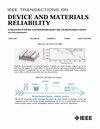P 沟道功率 VDMOS 晶体管中通过低温预处理释放氢分子对 NBTI 的影响
IF 2.5
3区 工程技术
Q2 ENGINEERING, ELECTRICAL & ELECTRONIC
IEEE Transactions on Device and Materials Reliability
Pub Date : 2024-02-14
DOI:10.1109/TDMR.2024.3365960
引用次数: 0
摘要
二氧化硅层和二氧化硅-二氧化硅界面中的氢分子会影响缺陷的形成,从而对硅基器件的可靠性起到关键作用。本文重点研究了氢分子释放对 p 沟道功率垂直双扩散金属氧化物半导体场效应晶体管 (VDMOSFET) 低温预处理 (LTPT) 负偏压温度不稳定性 (NBTI) 的影响。据观察,负偏压温度应力(NBTS)和 LTPT 能够改变阈值电压。阈下中隙技术(SMGT)分离了缺陷的数量。通过模拟和理论分析,分别验证了低温下原子的演变和 NBTS 期间缺陷的形成。此外,氢浸泡预处理 (HSPT) 实验也对其进行了验证。LTPT 使活性氢原子更容易形成氢分子。这一过程会促进氧化物电荷转化为 NBTS 期间的界面陷阱,甚至会加剧不稳定性。此外,尽管 LTPT 已被证明能提高器件性能,但它并不能有效缓解 NBTS 期间的不稳定性。总之,这一发现为在 p 沟道功率 VDMOS 晶体管的制造和封装过程中减少与氢有关的杂质,从而降低 NBTI 提供了一种优越的方法。本文章由计算机程序翻译,如有差异,请以英文原文为准。
Effect of Hydrogen Molecule Release on NBTI by Low-Temperature Pre-Treatment in P-Channel Power VDMOS Transistors
Hydrogen molecules in the SiO2 layer and the Si-SiO2 interface play a key role in the reliability of Si-based devices by affecting the formation of defects. This paper focuses on the effect of hydrogen molecule release on the negative bias temperature instability (NBTI) by low-temperature pre-treatment (LTPT) in p-channel power vertical-double-diffused metal-oxide-semiconductor field-effect transistor (VDMOSFET). The negative bias temperature stress (NBTS) and LTPT are observed to be able to shift the threshold voltage. The number of defects is separated by the subthreshold midgap technique (SMGT). The evolution of atoms at low temperature and the formation of defects during NBTS are verified through simulation and theoretical analysis, respectively. Additionally, it is also validated by a hydrogen-soaking pre-treatment (HSPT) experiment. The LTPT makes it easier for reactive hydrogen atoms to form hydrogen molecules. This process can promote the conversion of oxide charges to interface traps during NBTS and may even exacerbate the instability. Furthermore, although LTPT has been proven to improve device performance, it is not effective in mitigating instability during NBTS. Overall, this discovery points to a superior method of reducing NBTI by decreasing hydrogen-related impurities during the manufacturing and packaging processes of p-channel power VDMOS transistors.
求助全文
通过发布文献求助,成功后即可免费获取论文全文。
去求助
来源期刊

IEEE Transactions on Device and Materials Reliability
工程技术-工程:电子与电气
CiteScore
4.80
自引率
5.00%
发文量
71
审稿时长
6-12 weeks
期刊介绍:
The scope of the publication includes, but is not limited to Reliability of: Devices, Materials, Processes, Interfaces, Integrated Microsystems (including MEMS & Sensors), Transistors, Technology (CMOS, BiCMOS, etc.), Integrated Circuits (IC, SSI, MSI, LSI, ULSI, ELSI, etc.), Thin Film Transistor Applications. The measurement and understanding of the reliability of such entities at each phase, from the concept stage through research and development and into manufacturing scale-up, provides the overall database on the reliability of the devices, materials, processes, package and other necessities for the successful introduction of a product to market. This reliability database is the foundation for a quality product, which meets customer expectation. A product so developed has high reliability. High quality will be achieved because product weaknesses will have been found (root cause analysis) and designed out of the final product. This process of ever increasing reliability and quality will result in a superior product. In the end, reliability and quality are not one thing; but in a sense everything, which can be or has to be done to guarantee that the product successfully performs in the field under customer conditions. Our goal is to capture these advances. An additional objective is to focus cross fertilized communication in the state of the art of reliability of electronic materials and devices and provide fundamental understanding of basic phenomena that affect reliability. In addition, the publication is a forum for interdisciplinary studies on reliability. An overall goal is to provide leading edge/state of the art information, which is critically relevant to the creation of reliable products.
 求助内容:
求助内容: 应助结果提醒方式:
应助结果提醒方式:


